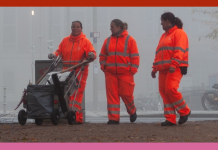Positive conversations around the impact of menopause can help mid-life women to thrive in the workplace by reducing menopause stigma
Older women often are less likely to pursue their ambitions in work due to menopause stigma, a study finds.
While women have less access to career opportunities, organisations must ensure they are not hindering women’s career progression through overlooked promotions, undervalued work, and lost opportunities.
1 out of 4 women feel that menopause stigma has negatively impacted their career development or work-related opportunities.
1 out of 4 women feel that menopause stigma has negatively impacted their career development
Often, menopause symptoms are treated with low support and empathy from managers and employers, causing 516,000 workforce departures due to menopause symptoms.
The University of Birmingham has developed a new tool for organisations to use to address the largely unexplored and underutilised positive, creative, and energising aspects of menopause.
The difference in menopause in China and Japan
Long seen as a disease or a disability in Western societies, menopause is traditionally viewed as a medical condition that creates physiological challenges which affect their work when compared with men of a similar age.
However, to contrast this, looking at societies such as China and Japan, workplaces are more sympathetic and understanding toward women going through menopause.
Workplaces must encourage positive conversations around the impact of menopause, the new study reveals.
Co-author Pilar Rojas-Gaviria, from the University of Birmingham, commented: “Western organisations can learn a lot from other cultures. For example, menopause tends to be a more welcome experience in China and Japan.
“Women in these countries have fewer hot flushes than their US and Canadian counterparts – rarely associating this condition with embarrassment.
“The terms ‘second spring’ or ‘rebirth’ are often associated with menopause in traditional Chinese medicine – suggesting a positive transition into middle age.”
Generating the ‘dialectic of Zest’ tool to reduce menopause stigma
The tool, titled the ‘dialectic of Zest’, explains the lived experiences of women as an oscillating pendulum swinging between spaces of social conformity and personal liberation.
The tool took inspiration from feminist writers such as Margaret Mead, Virginia Woolf, and Julia Kristeva, and was designed to encourage the adjustment of organisational policies and practices, which can either nourish or obstruct women’s experiences and expressions of zest.

Rojas-Gaviria, added: “Organisations must move towards a positive, creative vision of menopause in the workplace – creating the kind of environment that encourages women to make use of all their talents and creativity as part of the menopause experience.
“We offer ‘the dialectic of zest’ as a useful tool for organisations to pursue a better understanding of women in the workplace, addressing not only their needs but also their individual ambitions.
The researchers say it will help people better understand the multiple experiences of menopause in the workplace and reduce menopause stigma.
Experiencing menopause in the workplace will be well-placed to thrive
The researchers note that we should view menopause as a transformational phase that should not be viewed as deterioration and decline.
Medical interpretations of menopause, whilst essential for treating health conditions in older women, have overshadowed the lived experiences of aging women.
Two key steps that women experience in the process of liberation are based on:
- Woolf’s ‘killing the angel in the house’: stepping away from being devoted to other
- Kristeva’s ‘discovering the foreigner within’: focussing on their projects, dreams, and authenticity
If women are freed from the ‘angel in the house’ and discover the ‘foreigner’ within, then those experiencing menopause in the workplace will be well-placed to thrive.
Dr Rojas-Gaviria said: “The ‘dialectic of Zest’ tool creates a holistic approach to organisational care, where the full range of concerns, objective and ambitious of women experiencing menopause are considered.
The ‘dialectic of Zest’ tool creates a holistic approach to organisational care
“This is a powerful perspective that can inspire care not only for women but also for all individuals who may struggle with challenges in the workplace.
“Organisations wishing to benefit from these insightful women must also create opportunities for ‘education for all’ – a compelling avenue to create the kinds of context where women experiencing menopause can contribute, advance, and thrive.”











